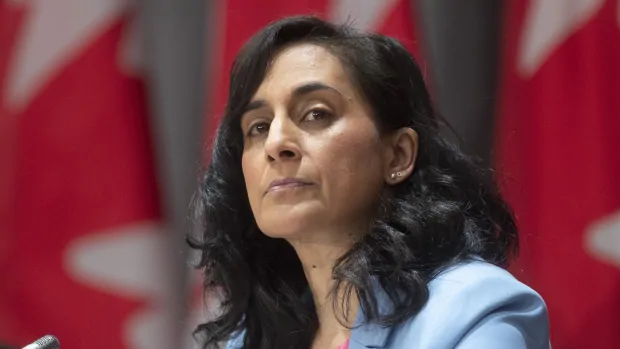In one of her first acts as Canada’s new defence minister, Anita Anand announced today she’s transferring the investigation and prosecution of sexual misconduct cases within the Canadian Forces into the civilian justice system.
The move follows a recommendation from retired Supreme Court justice Louise Arbour.
The military has been reeling over a series of sexual misconduct investigations. Since early February 2021, 11 current and former senior Canadian military leaders have been sidelined, investigated or forced into retirement from some of the most powerful and prestigious posts in the defence establishment.
Arbour is leading an external review into sexual harassment and misconduct in the Canadian military. She’s advising the federal government on how an independent, external reporting system — one which allows victims to report acts violence and misconduct without fear of reprisal — can be put in place.
Her review, which began in April, is expected to last about a year. Anand’s move today is in response to one of the interim recommendations Arbour gave to Anand’s predecessor, Harjit Sajjan, last month.
I have accepted in full Madame Arbour’s recommendations to move the investigation & prosecution of sexual misconduct cases to the civilian system. <a href=”https://t.co/ZD8Hr6bF9c”>pic.twitter.com/ZD8Hr6bF9c</a>
—@AnitaOakville
Arbour said that the Canadian Armed Forces (CAF) should continue to conduct administrative reviews of sexual misconduct cases in parallel with civilian courts, regardless of whether these cases result in charges.
Arbour said, however, that “particular consideration” should be given to “how and when civilian authorities — in the course of an investigation — should convey relevant information about the investigation to the CAF leadership.”
Change could help restore trust in military
Experts who study Canada’s military culture say the move is an important step toward rebuilding trust in the military and making it easier for victims to come forward.
“I think it’s fantastic. I think it’s something that victims have been asking for for a long time,” said Megan MacKenzie, Simons Chair in International Law and Human Security at Simon Fraser University.
“I think it shows that the new minister is willing to act decisively to follow the recommendations that have been made by both Justice Arbour and by previous experts.”
Charlotte Duval-Lantoine, a fellow at the Canadian Global Affairs Institute, said the move suggests Anand will bring a new sense of urgency to the sexual misconduct crisis.
She said Sajjan did not appear willing to push for major changes — something she said may be due in part to his long military career and his familiarity with its internal structures.
“It seems that it’s easier for [Anand], for sure,” Duval-Lantoine said.

While Duval-Lantoine said the change is a sign of hope, she also noted that many of the barriers facing sexual assault victims remain — such as complainants’ fear of reprisals or worries about having to repeat traumatic details to people who may doubt their claims.
“I don’t want to cry victory just yet because it is just one of the first steps,” Duval-Lantoine said.
Immediate action needed: Arbour
While the full report won’t come out until spring of next year, Arbour said in her October letter to Sajjan that she was releasing interim recommendations because action needs to be taken immediately.
“Since my appointment, it has been made public that survivors have continued to come forward and have raised allegations against [general officers and flag officers] who were in important command positions and were subsequently put on leave,” she said.
“These recurrent allegations of historical sexual misconduct against senior CAF leaders and the related Canadian Forces National Investigation Service investigations have led me to conclude that immediate remedial actions are necessary to start restoring trust in the CAF.”
In a media statement, Arbour said she welcomed Anand’s decision.
“As outlined in my interim report, the issue of sexual misconduct in the CAF has opened the institution to unprecedented scrutiny and an equally unprecedented opportunity for change. I will continue as part of my review to identify these opportunities in all the areas that fall within my mandate,” she said.
Survivors of sexual assault and misconduct in the ranks testifying before recent parliamentary committees have called for an external reporting agency.
Those committees launched hearings after the country’s two most senior military commanders — retired general Jonathan Vance and Admiral Art McDonald — were accused separately of inappropriate behaviour.
Some senior leaders are facing allegations of sexual misconduct and are under military police investigation. Two people have been charged criminally in connection to the claims. Some have launched public campaigns to fight for their jobs back.
In some cases, military leaders have been placed on leave in response to their handling of sexual misconduct files.
The investigations often came to light publicly only after journalists started asking questions of the Department of National Defence (DND).
DND says military police do not “proactively disclose the existence of ongoing investigations” because it could jeopardize the integrity of those investigations. Investigations are confirmed publicly on a case-by-case basis, taking into account the investigation, privacy rights and the public’s right to know, the department said.
Arbour’s review of military misconduct is not the first. Six years ago, the former Conservative government launched its own external review of sexual misconduct in the military, led by another former Supreme Court justice — Marie Deschamps. She recommended the government establish an independent agency for reporting misconduct.
That recommendation was largely ignored. Instead, DND created a sexual misconduct response centre — which, while independent of the military chain of command, only provides advice to victims.





















Discussion about this post